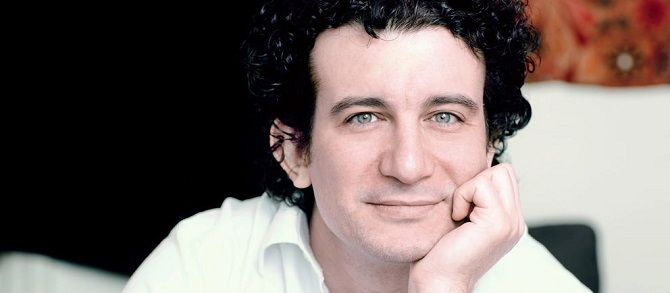A frequent quest at several opera houses worldwide, he has performed at the Metropolitan Opera in New York, the Royal Opera House Covent Garden in London, the Deutsche Oper Berlin, Bavarian State Opera in Munich and the three Parisian opera houses. He has appeared regularly at renowned music festivals in Salzburg, Bayreuth, Aix-en-Provence, and has performed with famous American orchestras, in Boston, Cleveland, Philadelphia and Chicago. He is admired for his versatility, as proficient in opera as in symphonic music.
Prior to assuming his new position, he directed the Frankfurt Radio Symphony orchestra at the Alter Oper in Frankfurt on February 12, 13 and 14, and was joined by French cellist Gautier Capucon. Among the works performed were Rimsky-Korsakov’s The Golden Cockerel, Ravel’s Daphnis et Chloé and the Cello Concerto Number 1 by Saint-Saens.
In an interview with the Hesse Radio hr2 cultural program on February 13, Altinoglu talked about his early education in music, which began at home. The family had lived in Turkey for generations; his father was a math professor, his mother a musician. Life for Armenians in Turkey was not easy, he said, and they moved from Istanbul to France. The name Altunyan had been Turkified to become Altinoglu. But his Armenian heritage, including the church, played an important role in his childhood and development. He related how his mother had played the organ in church, and how he continued after her death.
At the age of 6 or 7, he had his first encounter with symphonic music, marveling at the scores for all of Beethoven’s symphonies which his grandfather had collected. At 5, he had begun to play the violin, but “it was a catastrophe,” he said; “everyone suffered, my family, our neighbors and I.ˮ Then he started playing the piano, under the guidance of his mother, a professional, and the instrument became very special for him. At the age of 11 or 12, he said, he realized the power of music — “more music means less stupidity,ˮ he quipped. He continued his studies at the conservatory, and became an accomplished pianist.
He was still a youth when he discovered the power of the human voice, through his encounter with the mezzo-soprano Nora Gubisch, who would become his wife. He began to accompany her and the two have performed together and issued recordings. He stressed the fact that each voice is unique, a “direct way to the soul.ˮ In his career, he has worked with vocalists both in opera and in the solo (Lied, chanson) repertoire.
Although he never studied conducting formally, he read a great about it, observed conductors at work and talked to them about the art. When he was engaged with an orchestra, one day the conductor suddenly fell ill. This was the chance to try his hand at conducting, and, since he knew the score inside out, he was able to perform. Now he is a world class conductor as well as a teacher. He emphasized the importance of winning over youth to music, as the concert public is aging. He encourages school children to attend rehearsals, also with their parents, and to talk to musicians, so they can become acquainted with compositions and performance.
Altinoglu visited Armenia in 2015 and conducted the philharmonic orchestra in Yerevan, where he was impressed by the musical culture and the commitment of the musicians, who often worked under difficult conditions. Armenian is one of his several languages. He speaks it with his young son, who understands perfectly, even though he answers in French. Now, with his new position, Altinoglu will have to learn German, “perhaps with a French accent,ˮ he quipped.
Learning languages is very important, he noted. When asked whether he thought each language culture had a particular “soundˮ in its orchestras, he said he was absolutely convinced this is the case, that there is a “Frenchˮ sound and a “Germanˮ sound. In French, he finds that the strings are very transparent, and the music is more melodic, horizontal; whereas in German music the influence of Bach is most profound. He criticized the tendency in a globalized world to have all orchestras sound alike, insisting that each country, each culture, has its own characteristic sound.
Altinoglu is looking forward to his new engagement in Germany, the land of Goethe and Schiller. And, of course, Beethoven, whose 250th birthday is being celebrated throughout this year, with thousands of concerts, lectures, exhibitions, and new publications.
























































